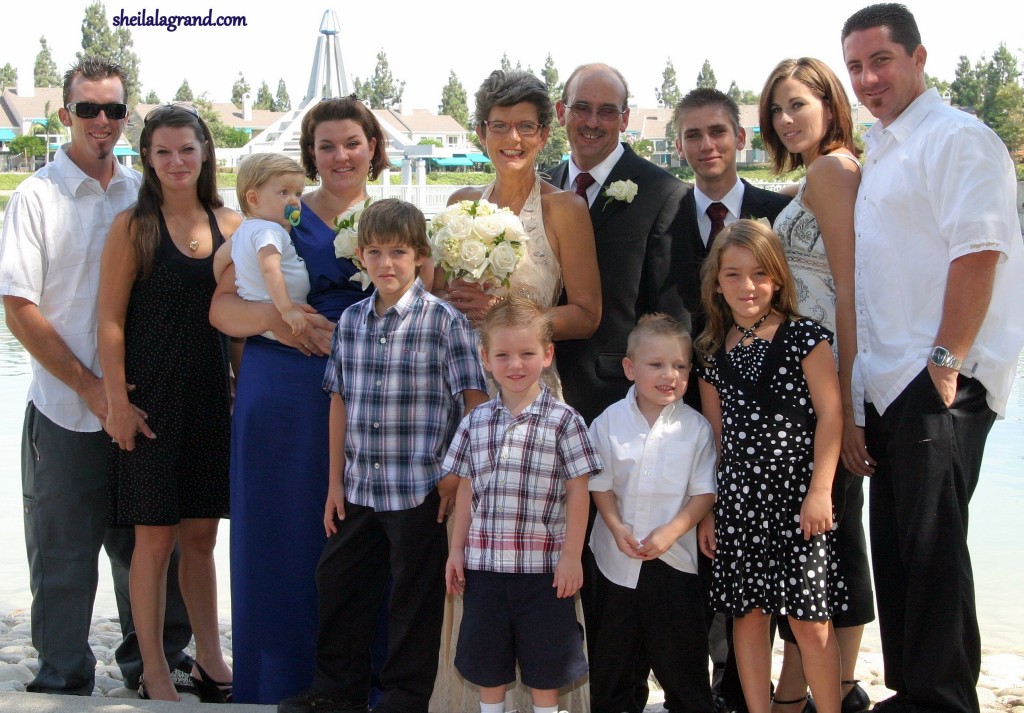Our Wedding Day. September 2, 2007.
My dad shook his head as if I had asked him whether he had visited the moon. “What? No! Of course not!”
My crazy question was this: When you found out you were going to be grandparents, did you and Mom talk about what kind of grandparents you would be? After my dad’s incredulous response, I asked his wife if she and her late husband had discussed the topic. My lovely bonus mom, Mercedes, echoed my dad’s reply. “No, honey,” she said, chuckling. “We never needed to talk about that.”
Apparently, in the freewheeling days of the 1980s, intentional grandparenting wasn’t a thing. Everybody knew what grandparents did–and by extension, what they didn’t do–and there was no need to reflect.
When Rich and I married in 2007, our five grandchildren attended. Only one of those five precious children carries my DNA. One more carries Rich’s. Four more grandlittles have debuted since we married, bringing the count to nine grandchildren. All three households include one woman (the mom) and one man (the dad). But in each household, the two resident adults are not the DNA-parents* of all three children who live there.
I suspect that whether grandparenting calls for discussion depends on who your partner grandparent is. My mother and father had reared three children together. As young parents, they navigated the waters of parent/grandparent relations. Maybe, late at night after a family visit with their parents, they lay in bed and said when we have grandchildren we’ll never make them watch Lawrence Welk with us.
Maybe, late at night after a family visit with their parents, they lay in bed and said when we have grandchildren, we’ll be sure to find a few minutes to spend alone with each one when they visit, just like your dad did today.
Maybe, late at night after a family visit with their parents, they fell into bed exhausted and didn’t need to discuss the timbre of the grandparent/grandchild relationship, and which notes resonated, and which notes made their ears bleed. Marriage can do that for you.
In any event, when I told them that they would soon be grandparents, they felt no need to sit down together and figure out how they would approach the business of being grandparents.
But when we began married life with grandchildren and adult children already in place, we lacked that shared history of how our parents treated our children. We had no memory bank stuffed with images of our parents as they went about the mundane, sacred business of grandparenting.
Our family composition has presented us with numerous challenges to bless us and grow us. But grandparents with blended families aren’t the only ones who may have different understandings of a grandparent’s role.
If as a child you had no grandparents in your life, how do you figure out your place as a grandfather?
If as a young parent your own parents didn’t embrace grandparenthood, who becomes your archetypal grandmother?
In our case, we sat down and talked about our dreams for our children and our grandchildren, and we came up with a few guiding principles. Maybe we’ll talk about those guidelines another time.
Sharing time: In your experience as a grandchild, a parent, or a grandparent, did everyone have the same idea of everybody’s role in the family? What were those roles? Did they change over time? If your family is blended, how does that play out in your extended family?
*We really, really dislike the s-word. We have no stepkids. We have bonus kids.
And other sheep I have, which are not of this fold: them also I must bring, and they shall hear my voice; and there shall be one fold, and one shepherd.
John 10:16 (KJV)
Please join us.






As I read your blog I thought these two people have used some wisdom to approach mixed grand children. I am sure your grand children appreciate your thoughtfulness. Blessing
Betty, thank you for your kind words. My most fervent hope is that our grandchildren never stop to think that we’re being thoughtful. I’d like it all to just feel like regular life. 🙂